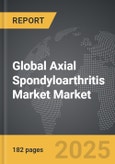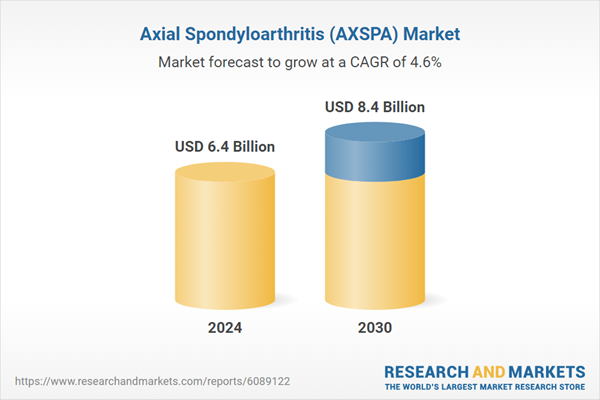Global Axial Spondyloarthritis (AxSpA) Market - Key Trends & Drivers Summarized
Why Is Axial Spondyloarthritis Gaining Visibility as a High-Burden Chronic Condition Requiring Early Diagnosis and Long-Term Therapeutic Management?
Axial spondyloarthritis (AxSpA) is drawing increased clinical and commercial focus as its prevalence and long-term impact on patient quality of life become more widely recognized. This inflammatory rheumatic disease primarily affects the spine and sacroiliac joints, manifesting as chronic back pain, stiffness, and reduced mobility. Despite its disabling nature, AxSpA remains underdiagnosed or misdiagnosed for years due to symptom overlap with non-inflammatory back pain and lack of early imaging-based confirmation.The disease encompasses two subsets - radiographic AxSpA (ankylosing spondylitis) and non-radiographic AxSpA - both of which can progress toward spinal fusion and irreversible joint damage if not adequately managed. The burden on working-age adults is particularly significant, with functional impairment, fatigue, and associated comorbidities such as uveitis, psoriasis, and inflammatory bowel disease further compounding healthcare complexity. These factors underscore the need for early, accurate diagnosis and sustained access to disease-modifying therapies.
Growing awareness campaigns, improvements in MRI-based diagnostic protocols, and revised clinical guidelines from rheumatology societies are helping increase recognition of AxSpA across healthcare systems. As more patients are identified earlier in their disease journey, demand for effective long-term therapeutic solutions is rising. Payers and healthcare providers are increasingly treating AxSpA as a priority chronic condition requiring integrated care models, long-term monitoring, and outcome-driven therapy optimization.
How Are Biologic Therapies, Precision Diagnostics, and Treatment Guidelines Advancing Patient Outcomes in AxSpA?
Biologic therapies - particularly tumor necrosis factor (TNF) inhibitors and interleukin-17 (IL-17) inhibitors - have become the cornerstone of AxSpA treatment for patients who do not respond adequately to NSAIDs. These agents not only reduce inflammation and alleviate symptoms but also help slow structural damage progression. IL-17 inhibitors, such as secukinumab and ixekizumab, are gaining traction due to their efficacy in both radiographic and non-radiographic forms of AxSpA, providing a targeted alternative for TNF-inadequate responders.Precision diagnostics are advancing treatment decisions, with HLA-B27 genetic testing, MRI-based inflammation assessment, and biomarker profiling enabling earlier diagnosis and stratified care. As understanding of disease heterogeneity improves, rheumatologists are increasingly leveraging these tools to differentiate AxSpA from mechanical back pain and tailor treatment pathways. The ability to confirm diagnosis prior to visible radiographic changes is critical in initiating timely intervention and avoiding irreversible joint damage.
Updated treatment guidelines from entities such as ASAS, EULAR, and ACR are standardizing care approaches and encouraging early referral to specialists. Stepwise escalation protocols - starting with NSAIDs, moving to biologics upon inadequate response, and integrating physiotherapy and lifestyle modifications - are guiding clinical decision-making. These frameworks are helping align payer policies, reduce delays in access to advanced therapies, and improve long-term disease control in diverse healthcare settings.
Which Patient Demographics, Regional Dynamics, and Access Models Are Driving Therapeutic Demand in the AxSpA Market?
AxSpA primarily affects individuals in their 20s to 40s, a demographic that underscores its societal and economic impact due to reduced workforce participation, absenteeism, and long-term disability. Gender-related differences in presentation and disease progression are influencing diagnosis and treatment patterns, as women with non-radiographic AxSpA often present with atypical symptoms and face delayed diagnosis. This has catalyzed efforts to improve gender-sensitive screening and raise clinical suspicion among primary care providers.Regionally, Europe and North America lead in diagnosis and treatment adoption, supported by specialist density, advanced diagnostic infrastructure, and broad access to biologics through public and private insurance systems. Asia-Pacific markets, particularly Japan and South Korea, are seeing increased diagnosis rates due to awareness campaigns and investment in rheumatology capacity. Emerging markets, while lagging in biologic accessibility, are expanding non-biologic treatment volumes and initiating government-funded pilot programs to enhance early detection and subsidized care.
Access models are evolving to address cost barriers associated with biologic treatment. Biosimilars are expanding therapeutic options at lower price points, enabling broader patient coverage and inclusion in national reimbursement schemes. Value-based pricing frameworks and risk-sharing agreements are being explored to align therapy costs with real-world outcomes. Meanwhile, patient assistance programs and digital health support tools are improving treatment adherence and enabling continuous disease monitoring in remote or underserved populations.
How Are Drug Development Pipelines, Digital Monitoring Tools, and Multimodal Care Models Shaping the Market Outlook?
The drug development pipeline for AxSpA is diversifying beyond TNF and IL-17 pathways, with investigational therapies targeting JAK-STAT signaling, GM-CSF inhibition, and novel cytokine pathways. Oral small molecules, in particular, are drawing attention for their ease of administration and potential to expand treatment to earlier stages or biologic-naïve populations. Clinical trials are increasingly stratifying by disease subtype, HLA-B27 status, and prior biologic exposure to better understand differential responses and optimize treatment sequencing.Digital tools for symptom tracking, treatment adherence, and disease activity monitoring are enhancing patient engagement and enabling data-driven care models. Mobile apps, wearables, and AI-based decision support systems are being integrated into rheumatology workflows to track pain, stiffness, sleep disruption, and mobility over time. These platforms are supporting remote consultations, treatment adjustments, and early identification of disease flares - improving real-time management and long-term outcome tracking.
Multimodal care models that combine pharmacological treatment with physiotherapy, psychological support, and lifestyle interventions are gaining traction in both public and private healthcare systems. As the chronic and multifaceted nature of AxSpA becomes more apparent, care coordination between rheumatologists, physiatrists, psychologists, and primary care providers is being emphasized. These integrated models not only improve patient-reported outcomes but also reduce healthcare utilization and overall cost of care.
What Are the Factors Driving Growth in the Axial Spondyloarthritis (AxSpA) Market?
The AxSpA market is expanding as diagnostic precision, biologic innovation, and healthcare system awareness converge to reframe the condition as a manageable chronic disease with tangible long-term benefits from early and sustained treatment. The shift from underdiagnosis to proactive disease monitoring is enabling better patient stratification and therapy alignment.Key growth drivers include rising prevalence among working-age populations, expanding access to biologics and biosimilars, global guideline harmonization, and increasing payer willingness to reimburse early-stage intervention. The integration of digital health tools and coordinated care models is further reinforcing market maturity and patient-centric innovation.
As chronic inflammatory diseases move to the forefront of healthcare priorities, could axial spondyloarthritis become a model for how early detection, precision therapy, and integrated care redefine long-term outcomes in autoimmune disease management?
Report Scope
The report analyzes the Axial Spondyloarthritis (AXSPA) market, presented in terms of market value (US$). The analysis covers the key segments and geographic regions outlined below:- Segments: Type (Ankylosing Spondylitis, Non-Radiographic Axial Spondyloarthritis).
- Geographic Regions/Countries: World; United States; Canada; Japan; China; Europe (France; Germany; Italy; United Kingdom; Spain; Russia; and Rest of Europe); Asia-Pacific (Australia; India; South Korea; and Rest of Asia-Pacific); Latin America (Argentina; Brazil; Mexico; and Rest of Latin America); Middle East (Iran; Israel; Saudi Arabia; United Arab Emirates; and Rest of Middle East); and Africa.
Key Insights:
- Market Growth: Understand the significant growth trajectory of the Ankylosing Spondylitis segment, which is expected to reach US$5.3 Billion by 2030 with a CAGR of a 3.7%. The Non-Radiographic Axial Spondyloarthritis segment is also set to grow at 6.4% CAGR over the analysis period.
- Regional Analysis: Gain insights into the U.S. market, valued at $1.7 Billion in 2024, and China, forecasted to grow at an impressive 7.2% CAGR to reach $1.6 Billion by 2030. Discover growth trends in other key regions, including Japan, Canada, Germany, and the Asia-Pacific.
Why You Should Buy This Report:
- Detailed Market Analysis: Access a thorough analysis of the Global Axial Spondyloarthritis (AXSPA) Market, covering all major geographic regions and market segments.
- Competitive Insights: Get an overview of the competitive landscape, including the market presence of major players across different geographies.
- Future Trends and Drivers: Understand the key trends and drivers shaping the future of the Global Axial Spondyloarthritis (AXSPA) Market.
- Actionable Insights: Benefit from actionable insights that can help you identify new revenue opportunities and make strategic business decisions.
Key Questions Answered:
- How is the Global Axial Spondyloarthritis (AXSPA) Market expected to evolve by 2030?
- What are the main drivers and restraints affecting the market?
- Which market segments will grow the most over the forecast period?
- How will market shares for different regions and segments change by 2030?
- Who are the leading players in the market, and what are their prospects?
Report Features:
- Comprehensive Market Data: Independent analysis of annual sales and market forecasts in US$ Million from 2024 to 2030.
- In-Depth Regional Analysis: Detailed insights into key markets, including the U.S., China, Japan, Canada, Europe, Asia-Pacific, Latin America, Middle East, and Africa.
- Company Profiles: Coverage of players such as Aemetis Inc., Air Company, Alder Fuels, Amyris Inc., BP plc and more.
- Complimentary Updates: Receive free report updates for one year to keep you informed of the latest market developments.
Some of the 44 companies featured in this Axial Spondyloarthritis (AXSPA) market report include:
- AbbVie Deutschland GmbH & Co. KG
- AbbVie Inc.
- Acelyrin, Inc.
- Affibody AB
- Amgen Inc.
- Astellas Pharma Inc.
- AstraZeneca plc
- Bayer AG
- Biogen Inc.
- Boehringer Ingelheim GmbH
- Bristol-Myers Squibb Company
- Celgene Corporation
- Daiichi Sankyo Company, Limited
- Eisai Co., Ltd.
- Eli Lilly and Company
- Galapagos NV
- Gilead Sciences, Inc.
- GlaxoSmithKline plc (GSK)
- Inmagene Biopharmaceuticals
- Janssen Biotech, Inc.
This edition integrates the latest global trade and economic shifts into comprehensive market analysis. Key updates include:
- Tariff and Trade Impact: Insights into global tariff negotiations across 180+ countries, with analysis of supply chain turbulence, sourcing disruptions, and geographic realignment. Special focus on 2025 as a pivotal year for trade tensions, including updated perspectives on the Trump-era tariffs.
- Adjusted Forecasts and Analytics: Revised global and regional market forecasts through 2030, incorporating tariff effects, economic uncertainty, and structural changes in globalization. Includes historical analysis from 2015 to 2023.
- Strategic Market Dynamics: Evaluation of revised market prospects, regional outlooks, and key economic indicators such as population and urbanization trends.
- Innovation & Technology Trends: Latest developments in product and process innovation, emerging technologies, and key industry drivers shaping the competitive landscape.
- Competitive Intelligence: Updated global market share estimates for 2025, competitive positioning of major players (Strong/Active/Niche/Trivial), and refined focus on leading global brands and core players.
- Expert Insight & Commentary: Strategic analysis from economists, trade experts, and domain specialists to contextualize market shifts and identify emerging opportunities.
Table of Contents
Companies Mentioned (Partial List)
A selection of companies mentioned in this report includes, but is not limited to:
- AbbVie Deutschland GmbH & Co. KG
- AbbVie Inc.
- Acelyrin, Inc.
- Affibody AB
- Amgen Inc.
- Astellas Pharma Inc.
- AstraZeneca plc
- Bayer AG
- Biogen Inc.
- Boehringer Ingelheim GmbH
- Bristol-Myers Squibb Company
- Celgene Corporation
- Daiichi Sankyo Company, Limited
- Eisai Co., Ltd.
- Eli Lilly and Company
- Galapagos NV
- Gilead Sciences, Inc.
- GlaxoSmithKline plc (GSK)
- Inmagene Biopharmaceuticals
- Janssen Biotech, Inc.
Table Information
| Report Attribute | Details |
|---|---|
| No. of Pages | 182 |
| Published | February 2026 |
| Forecast Period | 2024 - 2030 |
| Estimated Market Value ( USD | $ 6.4 Billion |
| Forecasted Market Value ( USD | $ 8.4 Billion |
| Compound Annual Growth Rate | 4.6% |
| Regions Covered | Global |









